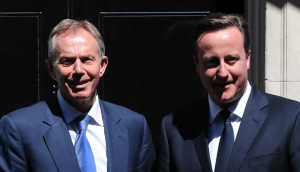From Baghdad to Brexit: Britain’s bookend mea culpas

Lisa Van Dusen/For The Hill Times
Sept. 26, 2019
As Britain grapples with the ongoing chaos of Brexit, a second prime minister in as many decades delivers a ‘my bad’ for a balls-up.
One of the signature features of life in our rambunctious 21st century seems to be the narcotic luxury of a collective amnesia that enables a chaos-addled society to ponder the actions of individual enablers in splendid isolation from one another.
Take the following mea culpa from a former British prime minister for catalyzing a narrative that led his country down a catastrophic garden path of lies and corruption that compromised his reputation and expedited public mistrust in institutions.
“For all of this, I express more sorrow, regret and apology than you can ever know or believe,” he said, perhaps inadvertently validating the disbelief of an audience whose suspension reflex was deactivated in part by his own record on the subject.
Was it David Cameron, atoning for treating the hornet’s nest of Brexit like a piñata? Nope—it was Tony Blair in 2016, expressing contrition for having rode shotgun on Dick Cheney’s bandwagon to Baghdad.
Here’s Cameron last week, apologizing for catalyzing a narrative that led the same country down a different garden path of lies and corruption that seriously compromised his reputation and expedited public mistrust in institutions:
“Do I have regrets? Yes. Am I sorry about the state the country’s got into? Yes. Do I feel I have some responsibility for that? Yes,” Cameron said in an interview with ITV plugging his new autobiography, For the Record.
While Brits may be feeling a clammy sense of déja vu at the spectacle of two prime ministers in as many decades expressing regret, not so much after the fact as after the misrepresentation of the facts, about two gargantuan sh*tshows—one of which cost the lives of 179 British soldiers, and the other which could generate multigenerational economic casualties—they can at least reassure themselves that the propensity for enabling divisive, distracting, and costly adventurism is a politically agnostic affliction.
That Nixon-to-China quality of the leading man of New Labour playing warmonger and the Etonian, Bullingdon Club alumnus playing Euro-cheerleader have now seemingly mutated into the one-man Jeremy Corbyn model of not so much disaster-catalyzing, implacable bravado as solution-obstructing, implacable amorphousness. Corbyn could actually join the pantheon of indispensable men who’ve willingly midwifed catastrophe alongside Blair, Cameron, and Boris Johnson by means not of kamikaze political priapism but of unflagging political flaccidity.
There’s a crucial difference between the role Blair played in enabling the war in Iraq and the role Cameron played in unleashing the Battle of Brexit. Blair participated in the trans-Atlantic corruption of intelligence to divide the labour of falsely justifying an unjust casus belli (events brought brilliantly back to life in Gavin Hood’s Official Secrets, now showing at a megaplex near you). Cameron presided over an amateurish, misleading, and procedurally reckless referendum whose disproportionately impactful 1.9 per cent majority was also influenced by corruption.
That corruption was not, evidently, engineered through a taxpayer-funded misinformation campaign, though, based on reporting since then, it deployed many of the same covert tactics one might have. It was an elaborate, democracy-hijacking covert operation involving a motley cast of co-conspirators including Cambridge Analytica, Steve Bannon, Facebook, and Nigel Farage and his cronies.
In a Guardian piece last week billed as part of Cameron’s effort—surely Sisyphean for a man with the lifetime platform of a former prime minister—to “reclaim the right to be heard” on his Brexit yarn, the former PM reclaimed his right to be heard telling his wife on his mobile he’d see her after “all these hideous interviews.”
In the words of that other indispensable man, Winston Churchill: “If one has to submit, it is wasteful not to do so with the best grace possible.”
Lisa Van Dusen is associate editor of Policy Magazine and a columnist for The Hill Times. She was Washington bureau chief for Sun Media, a writer for Peter Jennings at ABC News, and an editor at AP in New York and UPI in Washington.
